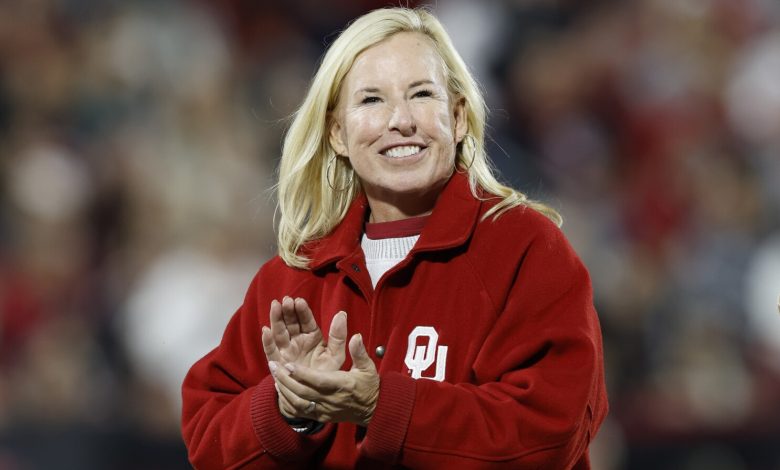“The athletes deserve it,” says Patty Gasso, who is advocating for a change in the doubleheader model.

Patty Gasso, the legendary head coach of the Oklahoma Sooners softball team, has long been a passionate advocate for her players and the sport of softball. With multiple national championships under her belt and decades of experience, Gasso commands respect across the collegiate softball landscape. Recently, she has turned her attention to a topic that resonates deeply with athletes and coaches alike: the doubleheader model.
In many college softball programs, especially within NCAA competition, teams often face the grueling challenge of playing doubleheaders—two games back-to-back or with minimal rest. This format, while traditional and rooted in scheduling convenience, has increasingly come under scrutiny. Gasso’s recent statements, emphatically saying “The athletes deserve it,” signal a strong push for reconsidering the physical and mental toll these demanding schedules place on student-athletes.
This article delves into Patty Gasso’s advocacy for reforming the doubleheader model, the reasons behind her stance, the history and structure of doubleheaders in softball, and what such changes could mean for the future of the sport and its athletes.
Patty Gasso: A Voice of Experience and Authority
Patty Gasso’s name is synonymous with excellence in college softball. Since taking over as head coach of the Oklahoma Sooners in 1995, she has built one of the most dominant programs in NCAA history. Her teams are known not just for their skill and competitiveness, but for their professionalism, resilience, and well-being.
Gasso’s deep understanding of the sport goes beyond X’s and O’s. She has witnessed firsthand the demands placed on athletes, from training to game days, and the toll it takes on their bodies and minds. Her advocacy for changing the doubleheader model comes from a place of genuine concern for the health and longevity of her players’ careers.
When she says, “The athletes deserve it,” Gasso is emphasizing a fundamental principle: the well-being of athletes should be prioritized over scheduling convenience or traditional norms.
Understanding the Doubleheader Model in College Softball
Doubleheaders have been a staple of softball and baseball schedules for decades. They often occur due to weather delays, travel logistics, or tournament formats requiring multiple games in a short window.
In college softball, a doubleheader typically means playing two seven-inning games on the same day, sometimes with only a short break in between. This compressed schedule demands exceptional stamina, focus, and recovery ability from players.
For pitchers, the strain is particularly acute. Pitching two games in one day can increase the risk of injury, affect performance, and limit the team’s ability to manage pitching rotations effectively. Position players also face challenges, dealing with fatigue that can affect fielding and hitting.
Despite these demands, doubleheaders remain common, partly because they help teams complete schedules efficiently, especially in conference play or during tournaments.
Why Change Is Needed: Patty Gasso’s Arguments
Gasso’s call for change stems from multiple concerns, all centered around the well-being and fair treatment of student-athletes:
1. Physical Health and Injury Prevention
Playing two intense games in one day increases the risk of injuries, especially overuse injuries that develop from cumulative stress. For pitchers, the risk of arm fatigue or more serious injuries like elbow or shoulder damage is significant.
Gasso argues that extending game schedules or reducing doubleheaders to single games with more rest would protect players’ health and extend their careers.
2. Mental and Emotional Well-being
The mental fatigue of playing back-to-back games can be just as taxing as the physical toll. Maintaining focus, managing stress, and staying mentally sharp are harder when athletes face long days with little downtime.
By changing the doubleheader model, Gasso believes players would have a better balance, allowing them to perform at their best and enjoy the game more.
3. Quality of Play and Competition
Fatigue inevitably impacts performance, which can affect the quality of the competition. Gasso points out that rested players are more likely to showcase their true abilities, leading to more exciting and competitive games.
This also benefits fans and the sport’s overall reputation.
4. Fairness and Equity
Given the increasing emphasis on athlete welfare across sports, Gasso stresses that softball should not lag behind. Many other sports have adjusted schedules to prioritize athlete health, and softball should do the same.
She insists that athletes, who dedicate immense time and effort, deserve schedules that respect their limits.
Potential Models for Change
Changing a long-established tradition like the doubleheader model is no small feat. However, several alternative approaches could address the concerns raised by Gasso and others:
Single Games with Extended Rest Days
Instead of squeezing two games into one day, schedules could be adjusted to allow single games on separate days, giving athletes adequate rest and recovery time.
Shortened Game Formats
Some have proposed modifying game length for doubleheaders—perhaps playing fewer innings per game to reduce fatigue while still maintaining the opportunity for multiple contests.
Improved Scheduling Around Weather and Travel
Greater flexibility in scheduling, including the use of buffer days, could help reduce the necessity for doubleheaders caused by weather delays or travel constraints.
Enhanced Pitching Restrictions and Recovery Protocols
Implementing stricter limits on pitch counts and mandated recovery days between appearances can protect pitchers from overuse during doubleheaders.
Broader Implications for Collegiate Softball and Athletics
Gasso’s advocacy is part of a broader movement within collegiate athletics emphasizing athlete welfare and long-term health. The NCAA and conferences have been increasingly attentive to these issues, with changes in practice limits, transfer rules, and mental health resources.
Reforming the doubleheader model could serve as a significant step forward, signaling a commitment to respecting athletes’ limits and valuing their contributions beyond just wins and losses.
Voices from the Field: What Do Athletes Think?
Many current and former collegiate softball players have voiced support for changes similar to those advocated by Gasso. Athletes emphasize the grueling nature of doubleheaders, particularly in hot weather or at high altitude, and the impact on their academic and personal lives.
Players often share that playing two intense games in a single day leaves them physically drained, with less time to focus on recovery, studies, or other responsibilities.
Challenges to Implementing Change
While the benefits are clear, there are obstacles to overhauling the doubleheader model:
- Scheduling Logistics: College softball schedules are complex, involving multiple teams, conferences, travel constraints, and academic calendars. Making room for more single games can be challenging.
- Financial Considerations: Doubleheaders can be cost-effective for programs and fans, consolidating travel and ticketing into fewer days.
- Tradition and Resistance to Change: As with many sports traditions, there may be resistance from some coaches, administrators, and fans who see doubleheaders as part of the game’s fabric.
However, Patty Gasso’s stature and advocacy bring weight to the conversation, encouraging stakeholders to rethink entrenched practices.
The Future: A Game That Respects Its Athletes
Patty Gasso’s call for changing the doubleheader model is more than just a coaching opinion—it is a plea rooted in respect for the athletes who make college softball what it is. By saying “The athletes deserve it,” Gasso underscores a simple truth: sports exist to empower, challenge, and inspire athletes—not to wear them down.
As the conversation grows, it is likely that other programs, conferences, and the NCAA will take note. Change may come gradually, but the momentum toward prioritizing athlete health and well-being is undeniable.
Patty Gasso’s advocacy for reforming the doubleheader model in college softball represents a crucial turning point in how the sport views and values its athletes. Her emphasis on the physical, mental, and competitive benefits of such change challenges the status quo and calls for a more compassionate and sustainable approach to scheduling.
If the sport heeds her call, it could lead to healthier athletes, better competition, and a stronger future for softball at all levels. After all, as Gasso eloquently states, “The athletes deserve it.”









